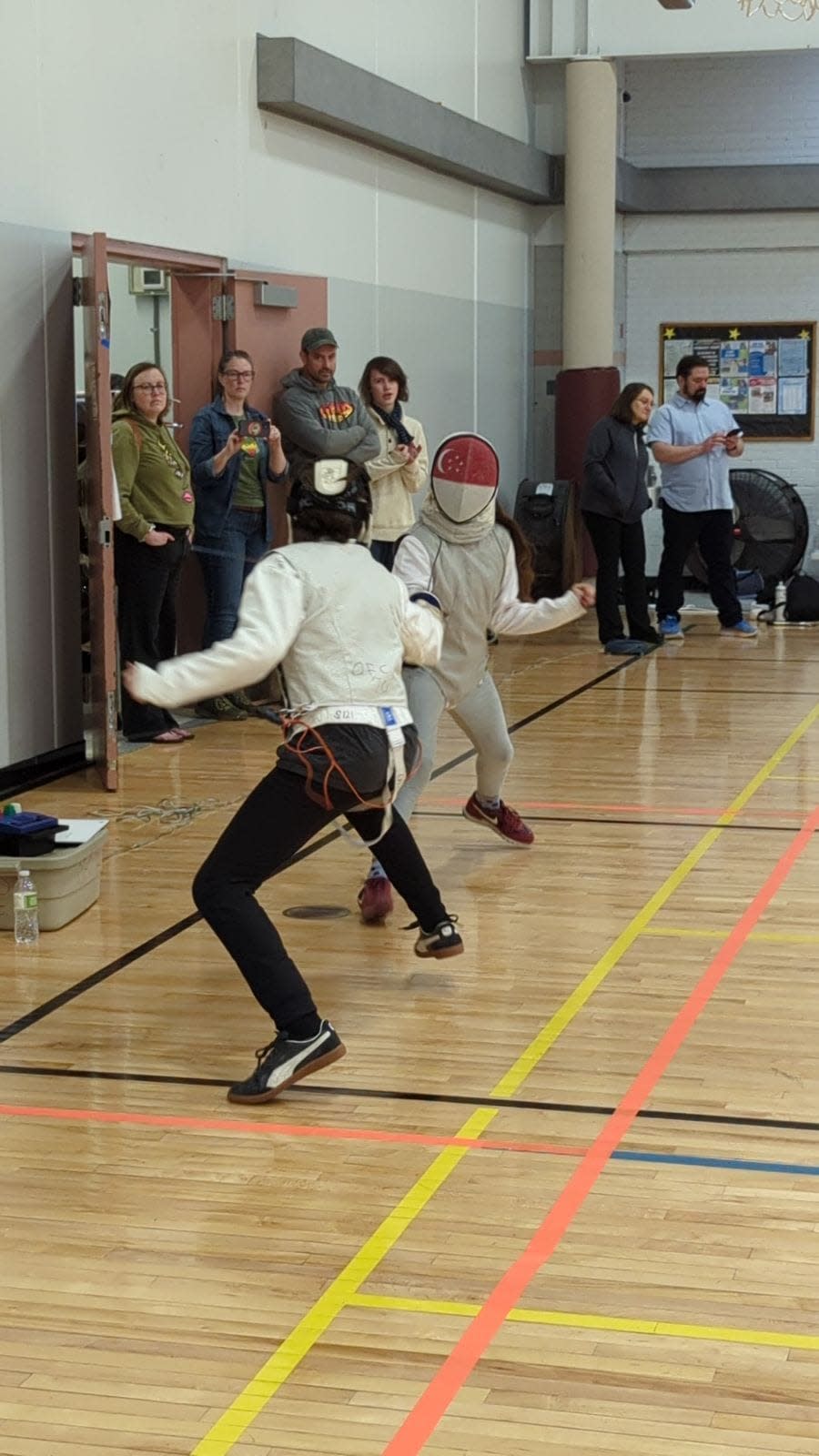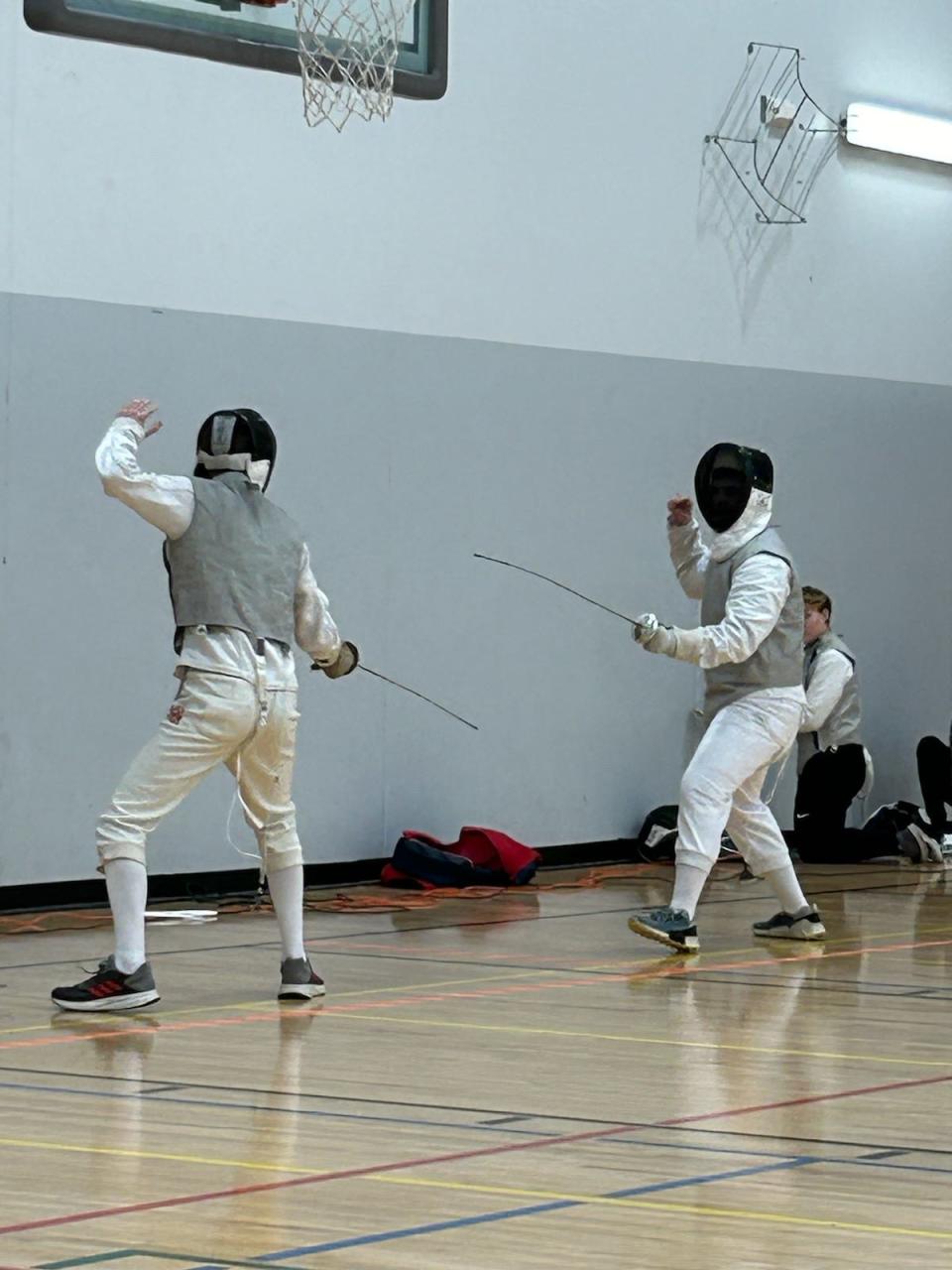Cornerstone Classical School brings the sport of fencing back to Salina
One of the world's oldest organized sports has found its way back to Salina after being absent for nearly a decade as the Cornerstone Classical School just finished its first fencing season.
There had been fencing in the city for many years, with origins being a club founded with support from Kansas Wesleyan University in 1995, which transitioned into the Kanza Fencing Club, where Cornerstone coach Charlie Todd began in the sport.
Todd said at the time, Kanza had a string of success under coach Gia Kvaratskhelia, a Republic of Georgia native who is now coaching at the University of Notre Dame.
"(Kvaratskhelia) really transformed the club from a recreational club to a national contender," Todd said. "We won a few national events and had couple NCAA scholarship fencers that came from Kanza."
Todd said after some transitioning with different coaches, Kanza unfortunately closed down in 2016. This wasn't the end of fencing in Salina and in Todd's life.
"(Headmaster) Chris Stevens heard that we had some experience with that and asked if I could bring it to Cornerstone," Todd said.

Overcoming obstacles to have a Cornerstone Classical School fencing team
Todd said he was happy with the interest shown at the school in its first year, as 13 students took part in the program.
"We're offering it for sixth grade through (12th)," Todd said.
As far as competitive fencing is concerned, one thing Cornerstone has to overcome is the fact that there aren't too many nearby places that have it.
"If you go to the coasts, for high schools, it would be like the equivalent of a (Kansas State High School Activities Association) sanctioned sport, but here in Kansas it's not very common," Todd said.
There are a few recreational fencing clubs in the state like Wichita and Lawrence and a competitive club at Kansas State University, but for this age group, the closest places that have competitive clubs, and competitive tournaments, are in Kansas City, Omaha and Lincoln, Nebraska and Tulsa, Oklahoma.
The distance to travel to these places was once obstacle Todd thought would be an issue with getting the team to compete, but another is the cost of equipment. Modern competitive fencing requires electronic scoring systems and gear, compared to the "dry" fencing that happens recreationally and during practice.
"I initially thought that we'd just start easy the first year and fence dry 'cause we don't all the gear and equipment to start something from scratch," Todd said. "Fortunately, we were able to, through funds of the school, have electric equipment and because of that, go to competitions this first season and have some success."
Cornerstone fencing already bringing medals and trophies back to Salina

Todd doesn't just describe the team as successful because of how far the 13 members have come in its first few months, but also because of the actual success it has brought home in the form of hardware from these competitions.
One of those successes has been Nahla Green, a seventh grade student who recently took third place in an Under-14 novice competition in Omaha.
Green had an interest in the sport after her father and Todd traveled to fence in St. Louis and took her along.
"They were fencing for fun and I thought that was really cool," Green said.
Todd said the novice tournament had 13 total people in it all of whom had to have been within the first year of competing in their first tournament, but there was plenty of experience among the competitors.
Having just started as a sponsored activity at Cornerstone in January, Stevens said he knew that Green was on the lesser end of the experience compared to other fencers her age.
More: City of Salina approves receiving $22 million federal grant for Smoky Hill River Renewal
Another successful fencer at Cornerstone this season has been Reisman Berg, a junior who also fenced at the Omaha event, placing third in the junior or Under-19 competition there.
"Reisman, (Cornerstone student) Jeremiah (Levis) and I were also on a team that took third place at an open tournament in Kansas City," Todd said. "It was out of three teams, but we still took home some hardware."
Fencing a benefit for Cornerstone students

Not only has this new adventure brought medals and trophies to Cornerstone, but it also has the benefit of bringing good skills for the students competing.
"It's a sport that's accessible to everybody," Todd said. "We all have an innate understanding of (the idea to) poke the other person first."
Todd said he has been impressed with how quickly the students have gotten precise with their blade work, noting that many novice fencers can be seen swinging their blade around. This precision as well as the endurance of competition are just some of the skills that can translate into other aspects of life.
Headmaster Stevens said the ability to manage and have composure is also important.
"(Fencing) requires power and aggression under control," said Stevens. "That's valuable."
Stevens said sportsmanship and respect for your fellow competitor is also something that can be learned in this sport.
"It's direct, martial contact (between two people)," Stevens said. "You're hitting someone with a sword, but then you shake hands when you're done... It requires the best of us, physically and spiritually."
As this successful season closes for Cornerstone Classical School's fencing team, currently the only sport sponsored by the school, Todd said he is looking forward to next year, where he hopes more students will be interested in joining.
This article originally appeared on Salina Journal: Salina's Cornerstone Classical School bringing fencing back to city

